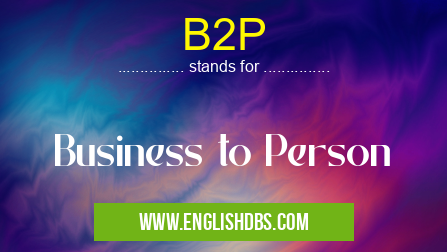What does B2P mean in BUSINESS
B2P (Business-to-Person) is a business model where companies sell products or services directly to individual consumers. It involves establishing a direct connection between businesses and their target audience. Unlike B2B (Business-to-Business) models that focus on selling to other businesses, B2P emphasizes on reaching individual buyers.

B2P meaning in Business in Business
B2P mostly used in an acronym Business in Category Business that means Business to Person
Shorthand: B2P,
Full Form: Business to Person
For more information of "Business to Person", see the section below.
Characteristics of B2P
- Direct Sales: Businesses engage directly with consumers through online platforms, retail stores, or other distribution channels.
- Customized Experience: B2P companies strive to deliver personalized experiences by tailoring products, services, and marketing campaigns to individual needs.
- Relationship Building: B2P interactions aim to foster long-term relationships with customers, building trust and loyalty.
- Data-Driven: Data analytics play a crucial role in understanding consumer behavior, preferences, and journey, allowing businesses to optimize their B2P strategies.
Benefits of B2P
- Increased Sales and Revenue: Direct connections with consumers enable businesses to bypass intermediaries, reduce costs, and increase profit margins.
- Enhanced Customer Experience: Personalized interactions and targeted marketing improve customer satisfaction and loyalty.
- Gaining Market Insights: Data collected from direct interactions provides valuable insights into consumer behavior, helping businesses refine their products and services.
- Brand Building: B2P interactions allow businesses to establish strong brand recognition and emotional connections with their target audience.
Essential Questions and Answers on Business to Person in "BUSINESS»BUSINESS"
What is Business to Person (B2P)?
Business to Person (B2P) refers to business activities where companies directly interact with individual consumers to provide products or services. B2P transactions typically involve a single customer purchasing a product or service for personal use.
How does B2P differ from B2B and B2C?
B2P differs from B2B (Business to Business) and B2C (Business to Consumer) models. B2B transactions occur between businesses, while B2C transactions involve companies selling to individual customers. B2P focuses on personalized interactions and tailored solutions for individual consumers.
What are the benefits of B2P?
B2P provides businesses with several benefits, including:
- Direct connection with customers allows for better understanding of individual needs.
- Increased customer loyalty and satisfaction through personalized experiences.
- Enhanced brand reputation by building strong relationships with individual customers.
- Opportunities for upselling and cross-selling products or services based on customer preferences.
What are the challenges of B2P?
B2P also presents some challenges:
- Maintaining data privacy and security of customer information is crucial.
- Providing personalized experiences for each customer can be resource-intensive.
- Building trust and establishing long-term relationships with individual consumers requires consistent effort.
What are some examples of B2P?
B2P transactions can be found in various industries, such as:
- Professional services (e.g., consulting, legal advice)
- Healthcare (e.g., personalized medical treatments)
- Education (e.g., online courses tailored to individual learning styles)
- E-commerce (e.g., personalized product recommendations)
Final Words: B2P is a powerful business model that empowers companies to connect directly with consumers. By leveraging technology and data analytics, businesses can deliver personalized experiences, build strong relationships, and drive growth through increased sales, enhanced customer satisfaction, and a deeper understanding of market trends.
